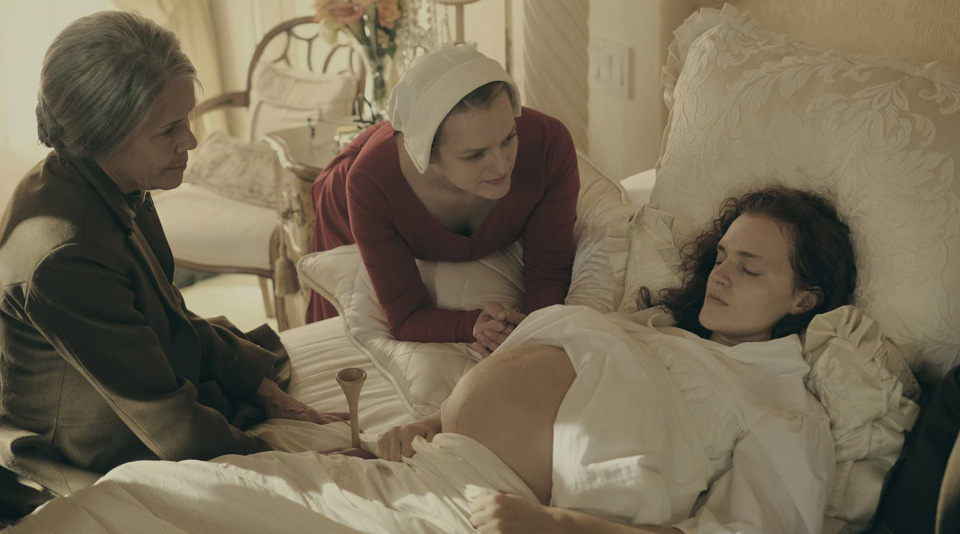
Cathy Colton’s previous Handmaid’s Tale episode reviews in People’s World can be read here.
Season One, Episode Two: “Birth Day”
Early on in this episode, Offred is thrilled to discover that Ofglen is not the “pious little shit” she thought she was. Instead, she is a member of the resistance. “There is an us!” It seems like a leftover from another time, she thinks, but “now there has to be an us. Because now there’s a them.” This is a starkly dualistic construction that fits in well with the black-and-white thinking of the regime. But, what the episode actually demonstrates are the many ways that Gilead’s rigid categories are blurred, transgressed, and resisted.
While there are numerous feminisms and multiple schools of thought that are anti-feminist or non-feminist, one opposition is between the unity and solidarity espoused by various groups of feminist women and a staunch individualism adhered to by many non-feminist women. The Gilead regime – rabidly anti-feminist by any measure – manages to foster a version of both of these, in perverse ways.
As Offred notes in the first episode, after someone in the household refers to Ofglen as her friend, “It’s bullshit. There are no friends here.” She knows that the handmaids are paired up for their shopping excursions and walks to spy on each other. It takes her and Ofglen so long to figure out that the other is not a true believer because letting that slip to the wrong woman would be a death sentence. They are intended to be kept from any feelings of solidarity; they are meant to stay mentally alone – an odd form of being an individual.
Yet, that does not mean that they are to be pre-Gileadean individuals. Each handmaid dresses the same in red robes and white headgear. Each Commander’s Wife dresses in identical green dresses. Marthas have their uniforms. The fact that handmaids are interchangeable is reinforced by their lack of names. Each has her individual name from before replaced with the “Of(Commander’s Name)” appellation.
When Offred goes out her gate to meet Ofglen at the end of the episode, only to discover a different woman there, she asks what became of Ofglen. “I am Ofglen,” the replacement says. Any healthy womb belonging to a Commander bears the same name. This grouping of women together through clothing and interchangeable names is not, of course, solidarity. But, solidarity – of a sort – does come to play in certain situations. Birth day is one of them.
Janine, now Ofwarren, is about to have a baby. All handmaids in the region are driven in the red birthmobile to support her. The sea of red surrounds the bed on which the one-eyed woman is in labor, with the Aunt who ordered the removal of her eye serving as midwife. While I would have found it terribly annoying to have thirty Lamaze coaches all urging me to “breathe, breathe, breathe” when I was bringing my children into the world, this scene does allow for the strongest sense of solidarity among the women. But, this group identity is also partially constructed in reaction to the “them” of the Commanders’ Wives, all congregated downstairs to offer assistance and comfort to Warren’s Wife as she mimics the labor of her handmaid upstairs.
Just as each Wife must be on the bed with the handmaid between her legs as her husband attempts to procreate with his red-robed woman each month, the handmaid giving birth will do so between the legs of the Wife for whom she is serving as surrogate womb. Offred’s scorn is palpable as she looks into the room housing the Wives when she first enters and sees the flat-bellied woman of the house on cushions, rhythmically breathing and sweating as if she were in labor.
Once again, Serena Joy sees Offred watching them. The woman to be watched is watching, and some of the power of the Wife is diminished by this act. A boundary is crossed further when Offred later enters the kitchen on an errand to see Serena Joy and a couple of other Wives talking in front of the table with a lavish spread of desserts. They ask her for news, then one asks her if she would like a cookie.
Offred says, “Yes, please,” takes a cookie, bites into it, then goes into the bathroom and spits it out before purposely wiping her mouth. She seems to want nothing to do with the Wives’ event. She is not one of them, and wants so little to be one of them, that she will spit them out. But, she wants to transgress into their space, exert the power of her gaze, and have the choice to reject their offering. As she walks away, one of the Wives says, “Whores. All of them.”
There is no solidarity between the women of different groupings, but there can be within each group. The strongest showing is after the baby girl has been born. She is taken away from Janine, who just endured her birth, and brought to the Wife, now lying on the bed as if she had just had a baby.
The handmaids all surround Janine so she will not have to see her child taken away, her labor co-opted by the class in power. In the novel, at the end of the birth day chapter, Offred thinks of her feminist mother: “Mother, I think. Wherever you may be. Can you hear me? You wanted a women’s culture. Well, now there is one. It isn’t what you meant, but it exists. Be thankful for small mercies.”
This review originally appeared on the author’s blog, And Another Thing.












Comments